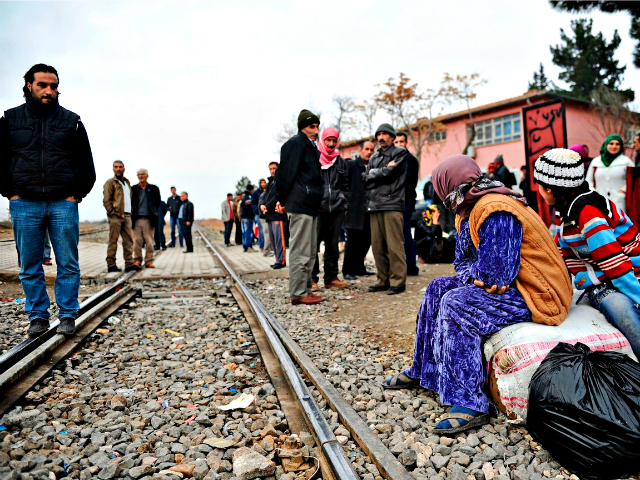Turkey has deported 4,500 Syrians this month alone, suggesting authorities are intensifying efforts to deal with the “rumbling grievances” by locals “over their prolonged presence,” Reuters reported this week.
It is unclear how many of the thousands of Syrians removed this month left by their own accord or were forced to leave. Turkey denies that it is forcibly deporting any Syrians.
Hurriyet Daily News quoted Interior Minister Suleyman Soylu as telling broadcaster NTV on Wednesday:
There are Syrians who come [to Turkey] via illegal means. We’ve taken them in and sent them to camps, saying that we have not given [you] a residence permit. No one under temporary protection can be deported. … What are doing with them? When we catch unregistered Syrians, we send them to camps. There are currently 100,000 people in the camps.
All Syrians in Turkey are reportedly under temporary protected status.
“Our problem is with refugees who live in Istanbul but are registered in other provinces. Since July 12, we have caught 6,122 people, 1,000 of whom are Syrians. Of them, 2,600 are Afghans. We catch all of them. And except for the Syrians, we transfer them to repatriation centers. Syrians are under temporary protection,” the minister said.
The deportations come less than a month after Turkey-backed rebels joined forces with al-Qaeda-linked jihadis to fight dictator Bashar al-Assad troops in an around Idlib.
Ankara is participating in operations in northwestern Idlib province that are inciting more violence, driving residents towards Turkey.
Referring to the 4,500 removals of Syrian refugees from Turkey this month, Reuters noted on Thursday:
The numbers represent only a tiny fraction of the 3.6 million Syrian refugees in Turkey, but the detentions and transfers suggest authorities are stepping up actions to address rumbling grievances over their prolonged presence.
They follow two clashes in Istanbul when crowds attacked Syrian shops, now targets of resentment for Turks who see Syrians as taking jobs and crowding out health and education services while Turkey battles an economic recession.
Most Syrians live in southern Turkish provinces near the border but Istanbul province holds the largest contingent. Many have started hiding at home, waiting for the wave of arrests to recede and some stopping work to express their anger.
While some Turks are expressing anger about the ongoing presence of Syrian refugees in their country, Ankara is fomenting unrest in Syria.
Thousands of al-Qaeda-affiliated terrorists, and to a lesser extent Turkey-backed rebels, control the territory in and around Idlib, the last rebel stronghold in Syria.
This month, Reuters revealed that about 300,000 people fleeing the Russian-backed Assad regime’s renewed bombardment against Turkey-backed rebels and al-Qaeda jihadis in Idlib that began in April are heading towards the Turkish border.
The displacement of Syrians is prompting the United Nations to warn that the province is on the brink of a “humanitarian disaster.”
Assad controls the majority of the country, except for large swathes of territory in the north, held by U.S.-backed Kurds, and the last remaining rebel and jihadi bastion in and around Idlib.
In 2017, when the Kurds were fighting the Islamic State (ISIS/ISIL), Assad indicated he was open to discussions about autonomy for the anti-Turkey Kurds who control most of northern Syria. Although the Kurds can help the regime fight the Turkey-backed rebels and the jihadis, the Assad regime has changed its tune now that the jihadi group’s territorial caliphate is no more, arguing that autonomy would open the door to partition of Syria.
In September 2018, Ankara and Moscow reached a failed agreement to establish a buffer zone in northern Syria’s Idlib province free of jihadis and their heavy weapons. Both countries have blamed one another for the failure.
The buffer zone was expected to keep Syrian government troops separate from their rivals, the Ankara-backed rebel forces.
It was supposed to prevent a humanitarian disaster that would drive a new wave of Syrian refugees flowing into Turkey from Idlib, but failed.
Al-Qaeda-linked jihadis capitalized on the international community’s near single-minded goal to annihilate their ISIS.
The focus on ISIS allowed al-Qaeda to establish an Islamic emirate in and around Idlib. Al-Qaeda-linked jihadis have surfaced as the most potent group standing in the war-ravaged country.
Despite the threat of a potential humanitarian disaster, the Assad regime began to target the rebel stronghold in April, but the terrorists remain in control of the area.
The situation is so chaotic in and around Idlib that the U.S. military joined the fray.
After a near two year hiatus, the U.S. launched deadly airstrikes against the al-Qaeda-linked militants in Syria’s Aleppo province, which borders Idlib.
“This operation targeted AQ-S [al-Qaeda in Syria] operatives responsible for plotting external attacks threatening U.S. citizens, our partners, and innocent civilians,” the U.S. military said in a statement after the strikes.

COMMENTS
Please let us know if you're having issues with commenting.